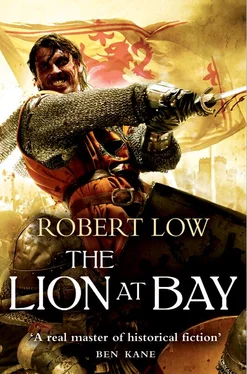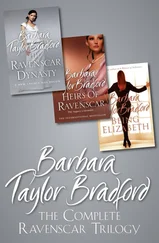He had a horse somewhere, but he did not expect to find it anytime soon. Eaten, he suspected, by these animals from the far north. He sank down, away from the fire, starting to shiver with all that had happened to him, cursing the pain, the earl, the countess and God, who had all forsaken him.
Then he discovered that the Devil, at least, held true. The fire he half-crawled to, wary as a fox round a kennel, had two men at it, one lying in a shelter, one tending something in a pot.
‘Not be long, your lordship,’ the fire tender declared cheerfully. ‘Good kail brose and a wee tait of black bread will return the life back in ye, eh?’
‘My thanks,’ answered the man wearily and Malise saw the torn yellow surcoat, the arms on the front. A prisoner, he thought, and then saw the face of the fire-tender, red-stained with flame as he leaned forward to taste the brose on a horn spoon.
Tod’s Wattie. The belly clench of it almost made him whimper and he bit his lip, bringing more pain to his face. He started to back away, then stopped. The Lothian has taken a lord for ransom; the thought of such riches for the likes of Hal of Herdmanston and his crew burned fear and pain out of Malise in an instant. And Tod’s Wattie had his back to him …
‘Could use some meat, mark ye,’ Tod said. ‘But, parole or not, my lord, I dare not leave ye.’
The slumped figure moaned slightly and Tod leaned down to rake through the contents of a pack, hoping the lord Hal had captured would not die; he felt the burn of shame for having failed to protect the Auld Sire of Herdmanston, paused as if frozen, his mind locked back to the madness of pikes and screaming, the bloody dying and that cursed, tangling blue banner.
John Fenton had died, falling under the iron-shod hooves of those English knights escaping across the brig, and Tod’s Wattie still found it hard to believe the steward of Roslin was gone. He had known John Fenton all his life and now he was gone, as if he had never walked and breathed at all.
He shook himself; there was, he was certain, a peck of oats which might thicken the broth, shove some life into the English lord who would be exchanged for the Auld Sire …
The blow was hard and low on one side of his back, hard enough to make him grunt and pitch forward on to his knees. Furious, bewildered, he staggered upright and turned to see Malise standing there, his face bloody and misshapen.
‘Ye gobshite,’ he snarled and started toward the man, only to find himself falling. He thought he had tripped and tried to spring up, aware that the blow on his back had started to burn.
‘Not so cantie now, houndsman,’ Malise hissed, wincing at the pain it caused him, and now Tod saw the dull winking steel in his hand, knew he was knifed and that it was a bad wound. He couldn’t seem to get up, though he kept trying, watching Malise’s booted feet move to the slumped, groaning figure of the knight.
Malise found the pulse of the moaning man’s neck with his fingers. The knight stirred, half-opened his eyes, wet and miserable in their pits of bruising.
‘Who is there?’ he asked in French and Malise cut the throat and the life from him in a swift, easy gesture of point and ripping edge.
He turned back to Tod’s Wattie, gasping and clawing up the mulch with one hand, the other trying to reach round to the pain in his back. Malise’s grin was feral and bright.
Slick as lamp oil, viscous with fluids, thick with dead like studs on a leather jack, the causeway to the brig was Hell brought to the surface of the earth and Isabel staggered along it, half-blind with fear and tears, falling as often as she walked and with no clear idea of where she was, or where she was going. Away. Just away from the unleashed monster that was Malise.
Figures moved in the twilight of the dying day, flitting like crouching demons, spitting out incoherent curses whenever they encountered another of their kind as they crow-fought over the dead.
The smell was rank and there was a noise, a low hum like the wind through a badly fitting door, as those still alive moaned out the last of their lives, calling on God, their mothers, anyone. They had lain here all through the day, dying hard and slow and untended save for the birds and the pillagers.
Isabel stumbled, fell, got up and staggered on, the silent terror behind her pushing her forward like a hand in her back. He had never hit her before. Never. The leash on him was off and Isabel knew Malise only too well, knew what he was capable of.
She weaved like the shadow of a drunk, found herself staring, slack-mouthed, at a knot of half-crouched figures, growling beast-shapes, half-silhouettes against the last greying light of the day, half gilded by the yellow light of a guttering horn lantern. One turned and she saw the knife, blood-sticky in a clotted hand. His other fist held a long, raw, wet strip of flesh and his eyes a crawling madness; the others never looked up, simply went on cutting and growling, as if butchering a fresh-killed sheep.
‘Get away from here, wummin,’ the man said and watched her lurch away before bending to his work again. It was only later, when the stories began to circle like a black wind, that Isabel realised that they had been flaying the English Treasurer, Cressingham.
Not then, though. She realised nothing but shapes and terror. A shadow fell on her as she collapsed, finally, to her knees and she whimpered; Malise had caught her. She looked up, squinting into the twilight and, with that part of her brain not screaming, she realised there was a splinter in her knee and that she was halfway across the brig.
‘You hag,’ said a voice out of the great black shape, a snorting Beelzebub whose cloven hooves stamped on the splintered planks. ‘There is no plunder on this side of the bridge, only death.’
Behind him, she saw the flames of hell leap up. Not Malise at all, but the Devil …
‘Mercy,’ she sobbed. ‘Have mercy on a poor sinner.’
She said it in French and the black shape paused, then leaned down. A strong arm grasped her own, hauling her upright. A face, sharp, black-bearded and weighing, thrust itself into her blurred vision, studied her for a long, curious moment, then turned his horse, so that she was hauled after him in a grip of iron.
‘Move if you want to live,’ the demon answered and she careered after him, shackled to his hand while the flames gibbered and danced, only vaguely wondering, in that small peach pit of sense left to her, why the Devil spoke French.
Chapter Eight
Balantrodoch, Templar Commanderie
Feast of St Andrew Protoclet, November 1297
Death came soft and gentle, yet harsh as haar, on the snow’s back. The news of it filtered down like the sifting flakes and crushed everyone with the chill of it.
The Hardy was dead in the Tower. The Auld Templar’s son was dead in the Tower. It was clear that the English Justinian, even though he was now in Flanders, had a long and petulant reach.
Worse still, the Auld Sire of Herdmanston was dead in Hexham Priory. Of his wounds, the messenger from Roslin said, but Hal knew better – his father, he was sure, had died of having been taken for ransom, at the realisation that he had fought bravely but with little skill and no strength, for age had robbed him of both.
He died from the knowledge that he had ruined Herdmanston, too, for the ransom would beggar the place and that, more than anything, Hal knew, had broken the life from the Auld Sire, like marrow from a snapped bone. The last thing Sir John could do to rescue the situation and all those who depended on him was to die.
And all because he had jumped off the fence, straight into the mire of a war where no-one was sure of his own neighbour. At the behest of the Auld Templar, too, which was worse still, for Hal was twice robbed of folk he held in high regard.
Читать дальше












